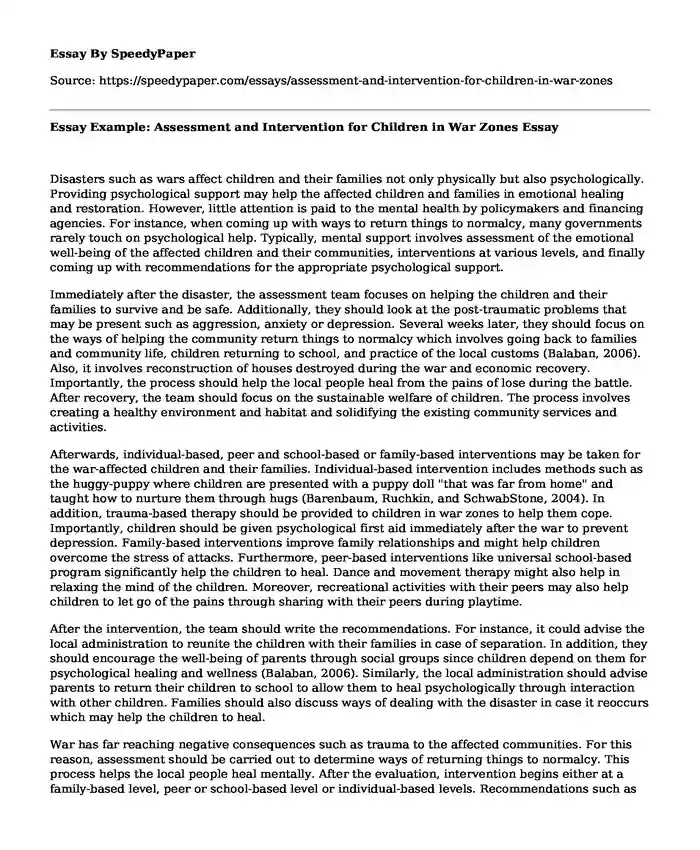
| Type of paper: | Essay |
| Categories: | Psychology War Child development |
| Pages: | 3 |
| Wordcount: | 581 words |
Disasters such as wars affect children and their families not only physically but also psychologically. Providing psychological support may help the affected children and families in emotional healing and restoration. However, little attention is paid to the mental health by policymakers and financing agencies. For instance, when coming up with ways to return things to normalcy, many governments rarely touch on psychological help. Typically, mental support involves assessment of the emotional well-being of the affected children and their communities, interventions at various levels, and finally coming up with recommendations for the appropriate psychological support.
Immediately after the disaster, the assessment team focuses on helping the children and their families to survive and be safe. Additionally, they should look at the post-traumatic problems that may be present such as aggression, anxiety or depression. Several weeks later, they should focus on the ways of helping the community return things to normalcy which involves going back to families and community life, children returning to school, and practice of the local customs (Balaban, 2006). Also, it involves reconstruction of houses destroyed during the war and economic recovery. Importantly, the process should help the local people heal from the pains of lose during the battle. After recovery, the team should focus on the sustainable welfare of children. The process involves creating a healthy environment and habitat and solidifying the existing community services and activities.
Afterwards, individual-based, peer and school-based or family-based interventions may be taken for the war-affected children and their families. Individual-based intervention includes methods such as the huggy-puppy where children are presented with a puppy doll "that was far from home" and taught how to nurture them through hugs (Barenbaum, Ruchkin, and SchwabStone, 2004). In addition, trauma-based therapy should be provided to children in war zones to help them cope. Importantly, children should be given psychological first aid immediately after the war to prevent depression. Family-based interventions improve family relationships and might help children overcome the stress of attacks. Furthermore, peer-based interventions like universal school-based program significantly help the children to heal. Dance and movement therapy might also help in relaxing the mind of the children. Moreover, recreational activities with their peers may also help children to let go of the pains through sharing with their peers during playtime.
After the intervention, the team should write the recommendations. For instance, it could advise the local administration to reunite the children with their families in case of separation. In addition, they should encourage the well-being of parents through social groups since children depend on them for psychological healing and wellness (Balaban, 2006). Similarly, the local administration should advise parents to return their children to school to allow them to heal psychologically through interaction with other children. Families should also discuss ways of dealing with the disaster in case it reoccurs which may help the children to heal.
War has far reaching negative consequences such as trauma to the affected communities. For this reason, assessment should be carried out to determine ways of returning things to normalcy. This process helps the local people heal mentally. After the evaluation, intervention begins either at a family-based level, peer or school-based level or individual-based levels. Recommendations such as taking the children back to school are also a significant part of psychological healing.
References
Balaban, V. (2006). Psychological assessment of children in disasters and emergencies. Disasters, 30(2), 178-198.
Barenbaum, J., Ruchkin, V., & SchwabStone, M. (2004). The psychosocial aspects of children exposed to war: practice and policy initiatives. Journal of Child Psychology and Psychiatry, 45(1), 41-62.
Cite this page
Essay Example: Assessment and Intervention for Children in War Zones. (2022, Mar 25). Retrieved from https://speedypaper.com/essays/assessment-and-intervention-for-children-in-war-zones
Request Removal
If you are the original author of this essay and no longer wish to have it published on the SpeedyPaper website, please click below to request its removal:
- Free Essay with Business Growth Strategies
- Understanding of the Definition of an Emergency - Essay Sample
- Morality Battles Friendship in Of Mice and Men. Literary Essay Sample
- Literary Essay Sample: Setting Analysis on Sonny's Blues Story
- Unified Modelling Analysis, Free Paper Sample
- Essay Example Discussing the Issues in Tech Integration (Privacy)
- Free Essay about the Impact of Concussion in Soccer
Popular categories




